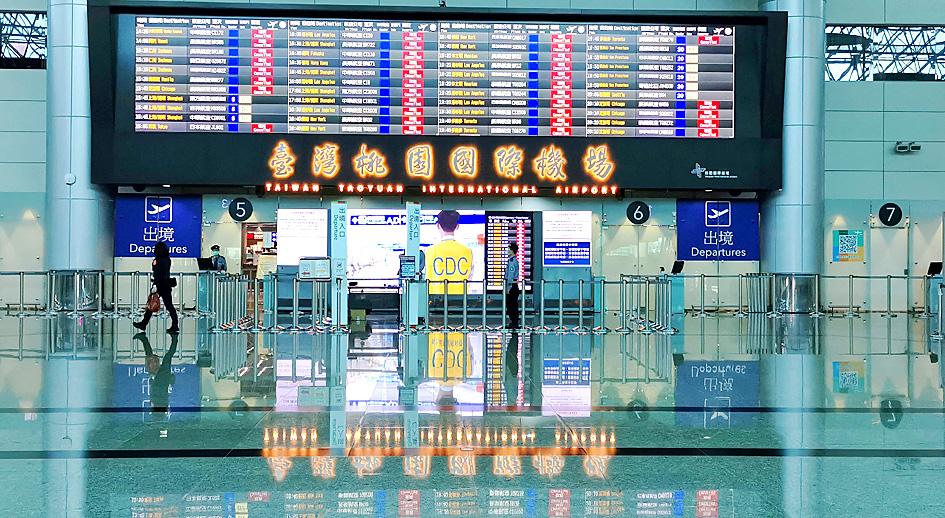Starting today, foreign travelers who have visited India in the past 14 days, but do not have a valid Taiwanese resident certificate would be temporarily banned from entering Taiwan, the Central Epidemic Command Center (CECC) said yesterday.
The announcement came after the center on Sunday said that all travelers who have been to India in the past 14 days, including transit passengers, would be placed in 14 days of centralized quarantine upon entering Taiwan, starting today.
They would also be required to take a mandatory polymerase chain reaction test for COVID-19 upon ending quarantine, and practice seven days of self-health management if they test negative.

Photo: Tony Yao, Taipei Times
The CECC also announced new disease prevention measures for flight crew members, after more than two dozen confirmed cases have been reported among China Airlines (中華航空) cargo pilots and staff at the Novotel Taipei Taoyuan International Airport hotel, as well as their family members, since last month.
Minister of Health and Welfare Chen Shih-chung (陳時中), who heads the center, last week said that the infection source might be flight crew members of foreign airlines who stayed at the hotel, where many China Airlines crew members have been quarantined upon returning to Taiwan.
Deputy Minister of the Interior Chen Tsung-yen (陳宗彥), who is deputy head of the center, said that the new policies aim to clearly separate the flight crew members of Taiwanese airlines from those of foreign airlines, as they are subject to different quarantine rules.
All crew members of foreign airlines would only stay in one designated hotel during their layovers in Taiwan, he said, adding that the Civil Aeronautics Administration (CAA) and the Taoyuan City Government would choose the hotel, he said.
Quarantine dormitories for crew members of Taiwanese airlines would be chosen by the CAA and operated by Novotel following disinfection, Chen Tsung-yen said, adding that the hotel would need to apply to the Taoyuan City Government for approval.
The CECC has asked the CAA to help Taiwanese airlines inspect the overseas layover arrangements of their crew members to avoid unnecessary exposure to local ground crew or hotel staff, he said.
It also asked the CAA to supervise the airlines to thoroughly monitor their employees’ health conditions, report symptoms and disinfect their shuttle vehicles, he said.
The airlines would also be asked to evaluate whether they can allow crew members to report for duty online or separately, he added.
Separately, Taipei Mayor Ko Wen-je (柯文哲) said that Taiwan has done a good job of fighting COVID-19, but there are a few flaws that could be improved, including different quarantine rules for airline crew members and arriving travelers, and not separating personnel and spaces at quarantine hotels.
Flight crew members should also be quarantined for 14 days, or they should be required to get vaccinated to have shorter quarantine periods, he said.
The cluster of infections linked to China Airlines and Novotel was caused by the same mistake that caused an outbreak at Taoyuan General Hospital earlier this year, Ko said.
Quarantine hotels and designated COVID-19 hospitals must separate their employees into groups that only work in designated areas to avoid cross-infection, he said.
Asked for comment, Chen Shih-chung said the quarantine policies can be further discussed with specialists, the CAA and the airlines.

SECURITY: As China is ‘reshaping’ Hong Kong’s population, Taiwan must raise the eligibility threshold for applications from Hong Kongers, Chiu Chui-cheng said When Hong Kong and Macau citizens apply for residency in Taiwan, it would be under a new category that includes a “national security observation period,” Mainland Affairs Council (MAC) Minister Chiu Chui-cheng (邱垂正) said yesterday. President William Lai (賴清德) on March 13 announced 17 strategies to counter China’s aggression toward Taiwan, including incorporating national security considerations into the review process for residency applications from Hong Kong and Macau citizens. The situation in Hong Kong is constantly changing, Chiu said to media yesterday on the sidelines of the Taipei Technology Run hosted by the Taipei Neihu Technology Park Development Association. With

CARROT AND STICK: While unrelenting in its military threats, China attracted nearly 40,000 Taiwanese to over 400 business events last year Nearly 40,000 Taiwanese last year joined industry events in China, such as conferences and trade fairs, supported by the Chinese government, a study showed yesterday, as Beijing ramps up a charm offensive toward Taipei alongside military pressure. China has long taken a carrot-and-stick approach to Taiwan, threatening it with the prospect of military action while reaching out to those it believes are amenable to Beijing’s point of view. Taiwanese security officials are wary of what they see as Beijing’s influence campaigns to sway public opinion after Taipei and Beijing gradually resumed travel links halted by the COVID-19 pandemic, but the scale of

A US Marine Corps regiment equipped with Naval Strike Missiles (NSM) is set to participate in the upcoming Balikatan 25 exercise in the Luzon Strait, marking the system’s first-ever deployment in the Philippines. US and Philippine officials have separately confirmed that the Navy Marine Expeditionary Ship Interdiction System (NMESIS) — the mobile launch platform for the Naval Strike Missile — would take part in the joint exercise. The missiles are being deployed to “a strategic first island chain chokepoint” in the waters between Taiwan proper and the Philippines, US-based Naval News reported. “The Luzon Strait and Bashi Channel represent a critical access

Pope Francis is be laid to rest on Saturday after lying in state for three days in St Peter’s Basilica, where the faithful are expected to flock to pay their respects to history’s first Latin American pontiff. The cardinals met yesterday in the Vatican’s synod hall to chart the next steps before a conclave begins to choose Francis’ successor, as condolences poured in from around the world. According to current norms, the conclave must begin between May 5 and 10. The cardinals set the funeral for Saturday at 10am in St Peter’s Square, to be celebrated by the dean of the College